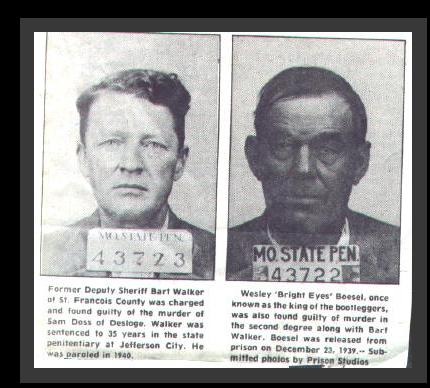

The preliminary hearing of Bart Walker, a former deputy sheriff of St. Francois County, and Wesley (Brighteye) Boesel, accused of being implicated in the murder of the late Samuel Doss, who was shot to death on the night of August 16th in his Desloge home, resulted in both being discharged by Justice of the Peace J. L. Cleveland last Saturday in Farmington.
Judge Cleveland refused to permit the prosecution to introduce evidence to show that Doss had been instrumental in bringing Federal agents to the Lead Belt, and that these agents had raided the place of Boesel. The prosecution intended to use this evidence for the purpose of showing the motive that prompted Boesel's action.
The hearing opened on Friday, both defendants denying their guilt at the outset. Among the witnesses for the prosecution was U.S. Prohibition Agent Carol Byrd of St. Louis. Attorney's Chas. Hay of St. Louis, Orin L. Munger of Piedmont, and Prosecuting Attorney Lee F. Kinder conducting the prosecution, while defendants were represented by Attorneys B. H. Marbury and Bert Boyer of Farmington.
The first witness was Doss' widow. She testified that she and her husband drove through Flat River the night of the murder and she noticed Deputy Sheriff Walker was watching them closely, causing her to be suspicious of him. This was about 45 minutes before Doss was shot down.
J. S. Mason, visiting at his daughter's home in Flat River, two doors from Boesel's restaurant, testified Deputy Sheriff Walker drove to the restaurant about 9 o'clock the night of the murder and took Constable Boesel away with him.
Mrs. H. C. Tuttle, who lives behind the Doss residence in Desloge, testified that an automobile, with lights extinguished, circled around the Doss residence about 20 minutes before the shooting.
Another witness, Leslie Black, who recently told authorities two men had tried to hire him to kill Doss, suffered from poor memory on the witness stand. He testified he had talked with Walker and Boesel about the prohibition agents making raids in Bonne Terre and one of them, he wasn't sure which one, had remarked: "Somebody ought to take a gun and go kill that ---------," meaning Doss.
Joseph Tinsley of Elvins, testified he had a conversation with Walker in Elvins after the liquor raids and Walker said: "Doss had the dope on me, but now I got the dope on Doss."
"Walker told me," the witness continued, "that the raiders took liquor from some of his friends, but that he went to St. Louis and bought back the evidence at $200 a pint, the understanding being that $50 a pint was to go to Federal men and the rest to Doss."
Deputy Sheriff William London recalled that when he entered the Sheriff's office about six weeks before the killing, Walker was there with a shotgun and greatly agitated. London took the gun from Walker, who told him Doss had threatened to "brain" Walker, because he suspected Walker of "planting" evidence which caused the arrest of William LaBruyere on a charge of stealing automobile accessories. Labruyere was a friend of Doss and is said to have led prohibition agents in a raid on Boesel's restaurant.
Sheriff Watts testified he received his first information on Doss' death when Walker telephoned him that night and suggested he investigate. Walker had told him several times that Doss had threatened him, once declaring he would "stomp Walker's head into the pavement." Walker had made no counter threats except to say he would defend himself, according to Sheriff Watts.
Sheriff Watts discharged Deputy Walker when the latter was named as a suspect. When Walker and Boesel were arrested, Sheriff Watts attempted to question them for the first time, but on advice of counsel they refused to talk.